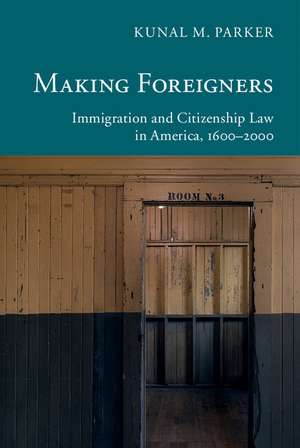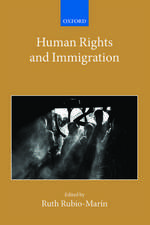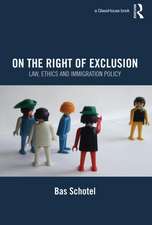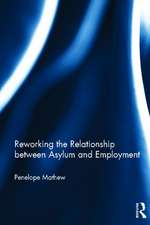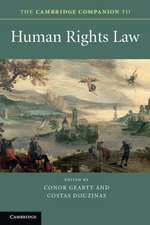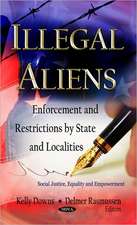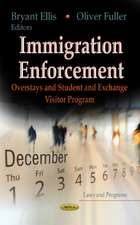Making Foreigners: Immigration and Citizenship Law in America, 1600–2000: New Histories of American Law
Autor Kunal M. Parkeren Limba Engleză Paperback – 30 aug 2015
| Toate formatele și edițiile | Preț | Express |
|---|---|---|
| Paperback (1) | 204.05 lei 6-8 săpt. | |
| Cambridge University Press – 30 aug 2015 | 204.05 lei 6-8 săpt. | |
| Hardback (1) | 702.03 lei 6-8 săpt. | |
| Cambridge University Press – sep 2015 | 702.03 lei 6-8 săpt. |
Preț: 204.05 lei
Nou
Puncte Express: 306
Preț estimativ în valută:
39.05€ • 40.85$ • 32.43£
39.05€ • 40.85$ • 32.43£
Carte tipărită la comandă
Livrare economică 03-17 aprilie
Preluare comenzi: 021 569.72.76
Specificații
ISBN-13: 9781107698512
ISBN-10: 1107698510
Pagini: 268
Dimensiuni: 153 x 231 x 15 mm
Greutate: 0.38 kg
Editura: Cambridge University Press
Colecția Cambridge University Press
Seria New Histories of American Law
Locul publicării:New York, United States
ISBN-10: 1107698510
Pagini: 268
Dimensiuni: 153 x 231 x 15 mm
Greutate: 0.38 kg
Editura: Cambridge University Press
Colecția Cambridge University Press
Seria New Histories of American Law
Locul publicării:New York, United States
Cuprins
1. Introduction; 2. Foreigners and borders in British North America; 3. Logics of revolution; 4. Blacks, Indians, and other aliens in antebellum America; 5. The rise of the federal immigration order; 6. Closing the gates in the early twentieth century; 7. A rights revolution?; 8. Conclusion and coda.
Recenzii
'Kunal Parker has accomplished the remarkable feat of challenging us to think differently about concepts - what it is to belong, what it is to be alien - that once seemed simple. Untangling the complexities of immigration from the Pilgrims to the Dreamers with a brilliant clarity, [he] traces the way that changing meanings of citizenship have been accompanied by paradoxical redefinitions of what it is to be foreign. As we struggle in our own political moment to reform immigration law, Making Foreigners offers indispensable perspective.' Linda K. Kerber, University of Iowa
'In Making Foreigners, Kunal Parker shows how American law defined alienage and citizenship in ways that have confounded simple oppositions of insider and outsider. [He] provides a powerful analysis of how various groups 'native' to American territory have been constructed as 'foreigners' in both law and society. Making Foreigners is a tour de force that makes us rethink how the very notion of being 'foreign' has little to do with where one might stand in relation to territorial boundaries.' Mae Ngai, Columbia University, New York
'In this breathtakingly sweeping, yet concise, 400-year history, Kunal Parker highlights how through much of American history both immigration and citizenship law rendered individuals and entire groups, from both inside and outside the territorial borders of the United States, 'foreign'. In doing so, he challenges the dichotomy between insiders and foreigners and opens to question the current immigration and deportation regime.' Barbara Welke, University of Minnesota
'Making Foreigners offers important insights about the relationship between the nation's treatment of domestic minorities and foreigners.' Kevin Johnson, The Journal of American History
'Making Foreigners manages to contribute to the scholarship in the areas of: U.S. immigration law and policy, Latino Studies, Native American Studies, African American studies, women's studies, Asian Americans, and studies of the poor … the book lays out a provocative new thesis that deserves serious discussion and engagement.' Anna O. Law, Law and Politics Book Review
'Provides a sweeping and bold reconceptualization of the history of American immigration and citizenship law. … The history of restrictive immigration law and the legal disabilities of the foreign-born in the United States, Parker argues, must be examined in tandem with multi-layered political and legal structures reducing various groups of native-born insiders, such as women, African Americans, Asian Americans, Latino Americans, American Indians, and the poor, into second-class citizens or virtual foreigners in their status and rights. … Parker's broad conceptualization of immigration and citizenship law has enormous value for historians of American immigration and ethnicity. … truly a laudable addition to American historical and legal scholarship.' Hidetaka Hirota, Journal of American Ethnic History
'Presents a long-term view of America's struggle over defining cultural and legal others, from those coming from outside the borders to those born within them. … Parker shows throughout how native-born citizens, in effect 'native-born foreigners', continued to share legal disabilities with aliens not just through cultural discrimination but also through the law itself. … Parker's book is a very welcome synthesis of a long (and ongoing) story.' Nancy L. Green, The American Historical Review
'Parker's work sheds light on the ways political and legal shifts have allowed the American state to incorporate outsiders, while also rendering insiders foreign … The expansive timeline and ambitious scope of Parker's argument provides a fresh and exhaustive overview of immigration and citizenship history. Highly Recommended.' Ashley Johnson Bavery, Reviews in American History
'In Making Foreigners, Kunal Parker shows how American law defined alienage and citizenship in ways that have confounded simple oppositions of insider and outsider. [He] provides a powerful analysis of how various groups 'native' to American territory have been constructed as 'foreigners' in both law and society. Making Foreigners is a tour de force that makes us rethink how the very notion of being 'foreign' has little to do with where one might stand in relation to territorial boundaries.' Mae Ngai, Columbia University, New York
'In this breathtakingly sweeping, yet concise, 400-year history, Kunal Parker highlights how through much of American history both immigration and citizenship law rendered individuals and entire groups, from both inside and outside the territorial borders of the United States, 'foreign'. In doing so, he challenges the dichotomy between insiders and foreigners and opens to question the current immigration and deportation regime.' Barbara Welke, University of Minnesota
'Making Foreigners offers important insights about the relationship between the nation's treatment of domestic minorities and foreigners.' Kevin Johnson, The Journal of American History
'Making Foreigners manages to contribute to the scholarship in the areas of: U.S. immigration law and policy, Latino Studies, Native American Studies, African American studies, women's studies, Asian Americans, and studies of the poor … the book lays out a provocative new thesis that deserves serious discussion and engagement.' Anna O. Law, Law and Politics Book Review
'Provides a sweeping and bold reconceptualization of the history of American immigration and citizenship law. … The history of restrictive immigration law and the legal disabilities of the foreign-born in the United States, Parker argues, must be examined in tandem with multi-layered political and legal structures reducing various groups of native-born insiders, such as women, African Americans, Asian Americans, Latino Americans, American Indians, and the poor, into second-class citizens or virtual foreigners in their status and rights. … Parker's broad conceptualization of immigration and citizenship law has enormous value for historians of American immigration and ethnicity. … truly a laudable addition to American historical and legal scholarship.' Hidetaka Hirota, Journal of American Ethnic History
'Presents a long-term view of America's struggle over defining cultural and legal others, from those coming from outside the borders to those born within them. … Parker shows throughout how native-born citizens, in effect 'native-born foreigners', continued to share legal disabilities with aliens not just through cultural discrimination but also through the law itself. … Parker's book is a very welcome synthesis of a long (and ongoing) story.' Nancy L. Green, The American Historical Review
'Parker's work sheds light on the ways political and legal shifts have allowed the American state to incorporate outsiders, while also rendering insiders foreign … The expansive timeline and ambitious scope of Parker's argument provides a fresh and exhaustive overview of immigration and citizenship history. Highly Recommended.' Ashley Johnson Bavery, Reviews in American History
Notă biografică
Descriere
This book connects the history of immigration with histories of Native Americans, African Americans, women, the poor, Latino/a Americans and Asian Americans.
